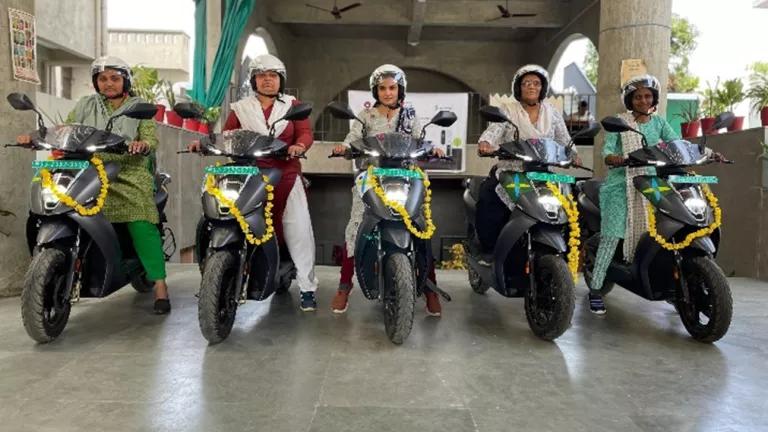Unlocking the Billion-Dollar EV Opportunity for Gujarat
While COVID-19 is an immediate priority for India, actions to reduce harmful emissions such as by transitioning to electric mobility can achieve major wins for public health, for the environment, and for India’s economy.

Guest Blog by Nitish Arora and Charu Lata
While COVID-19 is an immediate priority for India, actions to reduce harmful emissions such as by transitioning to electric mobility can achieve major wins for public health, for the environment, and for India’s economy. The state of Gujarat aspires to be an electric mobility hub and was one of the earliest states to draft an electric vehicles (EV) policy. Stakeholders are now calling upon the state to finalize and release the Gujarat EV policy to keep up with market trends as well as reap the economic, environmental, and societal benefits of a robust EV market.
A recent panel discussion, Unlocking the Billion-Dollar EV Opportunity for Gujarat, hosted by NRDC, CEPT University, and Gujarat Energy Research & Management Institute (GERMI), highlighted how Gujarat can harness its strength as a growing auto hub in the global shift toward EVs.
Highlights from the Discussion
Gujarat is committed to advancing electric mobility. Mr. Akhilesh Magal (GERMI) highlighted the initiatives taken by the state so far, including classifying EVs as a ‘sunrise’ sector as part of its Industrial Policy 2020, and setting up a lucrative incentive structure to bring in investments for EV manufacturing and allied industries.
He emphasized how collective action from industry can support the creation of political will necessary to quickly formalize the EV policy. That can support setting up the manufacturing base and pave the way for reduced dependence on vehicle and component imports, aligning with the “Make in India” and “Atmanirbhar Bharat” (self-reliant India) campaigns. The Society Of Manufacturers Of Electric Vehicles (SMEV) and stakeholders also plan to send a coalition letter of support to the state government to formalize the Gujarat EV policy.
Over 80% of cities in India struggle with unhealthy air quality. Shivanand Swamy of CEPT University stressed that EVs make even more sense for the cities of Ahmedabad, Vadodara, Rajkot, and Surat - where air quality has been deteriorating over the last five years, and the concentration of fine particle pollution/ particulate matter (PM) pollution has almost doubled. Widespread adoption of EVs would reduce exposure to nitrogen oxides (NOx), sulfur oxides (SOx), and PM, thus improving health outcomes.
Resolving the ‘chicken-and-egg’ dilemma facing charging infrastructure providers. From the stakeholder perspective, EV charging should be accorded infrastructure status and that the government should have a long-term policy strategy, like it does for manufacturing-related investments. There is no need for fiscal incentives to bring financial viability into the charging infrastructure business. Rather, the government should put in place enablers like socializing the grid upgradation cost, ensuring the energy operator has adequate power load, and land lease at viability rentals. Stakeholders proposed an innovative approach to create a few champion cities, saturating them with charging infrastructure, rather than spreading efforts across the state. This could create more EV public awareness and mass adoption. Fortum, a leading energy operator, expressed interest in partnering with the Gujarat state government to set up charging infrastructure.
Power utilities play an important role in the transition to electric mobility.
NRDC’s Dr. Simon Mui explained how state governments are partnering with power utilities in the U.S. and investing heavily in charging infrastructure. There is a tremendous opportunity to integrate the use of renewable energy to power EVs, especially as Gujarat has growing renewable energy capacity.
Identify hotspot use cases to jumpstart EV adoption. A targeted approach toward high use cases such as fleet operators, e-commerce, and logistic companies can help accelerate EV adoption in B2B use cases. The economics work well here as these vehicles put in more kilometers compared to private vehicles. For widespread EV adoption, Mr. Rahul Bhatnagar of Hero Moto Corp, suggested innovative business models such as battery leasing to separate out the battery cost (about 40%) from the vehicle. This would reduce the high upfront costs of EVs versus internal combustion engine (ICE) vehicles. Creating an aspirational value around EVs can help engage youth as ambassadors to accelerate EV adoption.
Holistic policy framework to increase the appetite of EVs. Aside from the traditional policy instruments of leveraging fiscal incentives, stakeholders suggested using non-fiscal measures to incentivize EVs over ICE vehicles. Low emission zones and zero emissions vehicle (ZEV) policies have successfully accelerated EV adoption in U.S. and European markets. Additionally, innovative financing instruments can help improve the bankability of projects in the EV sector. Several emerging financial solutions for EVs are presented in NRDC Issue Brief: Stakeholder Driven Solutions for Financing Electric Mobility.

NRDC and partners released new EV resources
During the discussion, NRDC and partners released a new factsheet, Transitioning to Electric Mobility in Gujarat, emphasizing the impacts and benefits of the state’s EV policy. The full report on Gujarat EV Policy can be found online here.
Both Nitish Arora and Charu Lata are Electric Mobility and Clean Energy Experts working as consultants with NRDC's India Program.




